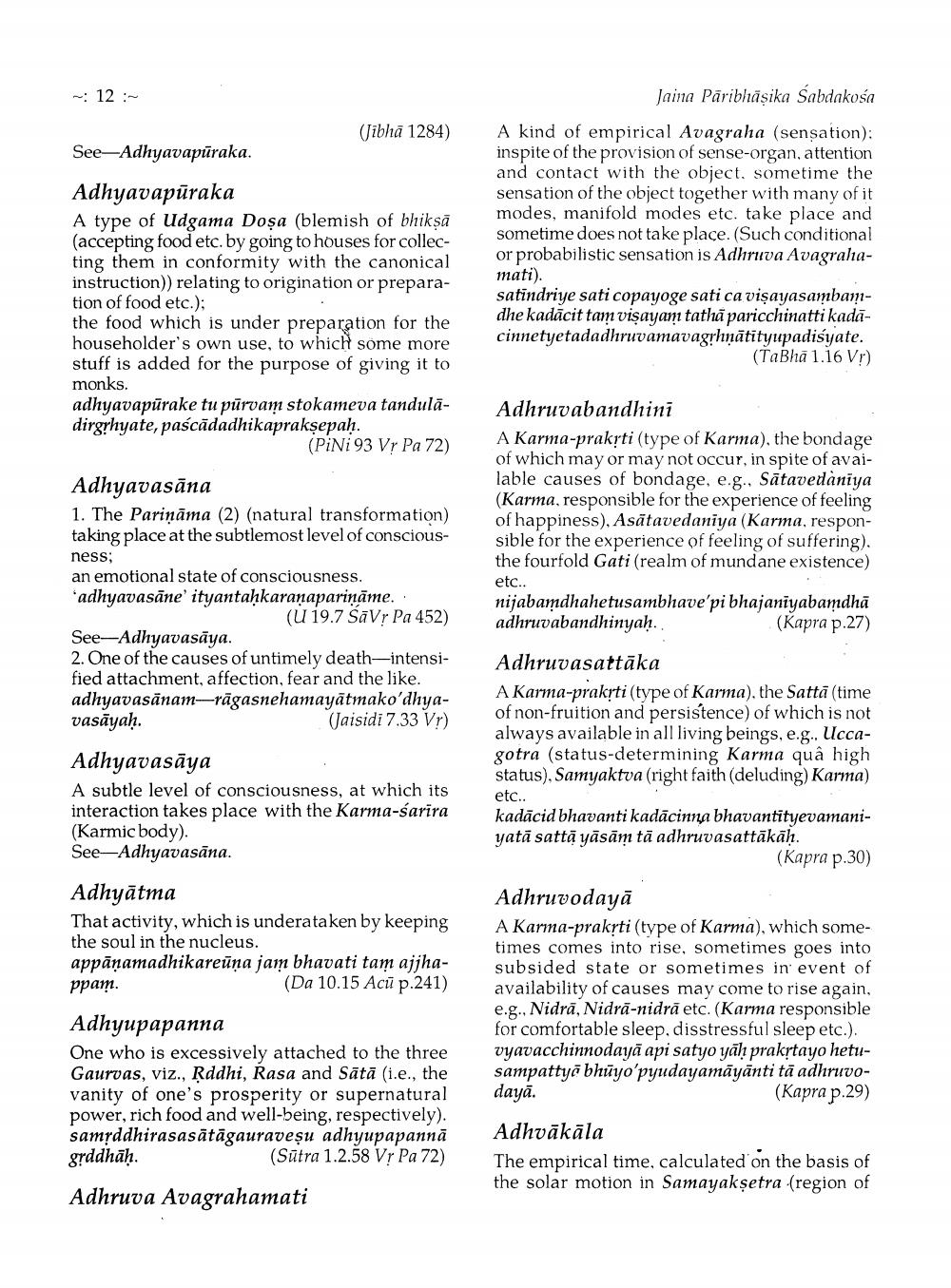________________
- 12 :
(Jibhā 1284)
See-Adhyavapüraka.
Adhyavapūraka A type of Udgama Dosa (blemish of bhikṣā (accepting food etc. by going to houses for collecting them in conformity with the canonical instruction)) relating to origination or preparation of food etc.); the food which is under preparation for the householder's own use, to which some more stuff is added for the purpose of giving it to monks. adhyavapūrake tu pūrvam stokameva tandulādirgshyate, paścādadhikaprakṣepah.
(PiNi 93 Vr Pa 72)
Jaina Pāribhāṣika Sabdakosa A kind of empirical Avagraha (sensation): inspite of the provision of sense-organ, attention and contact with the object, sometime the sensation of the object together with many of it modes, manifold modes etc. take place and sometime does not take place. (Such conditional or probabilistic sensation is Adhruva Avagrahamati). satindriye sati copayoge sati ca visayasambamdhe kadācit tam vişayam tathā paricchinatti kadacinnetyetadadhruvamavagyhņātityupadisyate.
(TaBhā 1.16 Vr)
Adhruvabandhini A Karma-prakṣti (type of Karma), the bondage of which may or may not occur, in spite of available causes of bondage, e.g.. Sätavedaniya (Karma, responsible for the experience of feeling of happiness), Asātavedaniya (Karma, responsible for the experience of feeling of suffering). the fourfold Gati (realm of mundane existence)
etc..
Adhyavasāna 1. The Parināma (2) (natural transformation) taking place at the subtlemost level of consciousness; an emotional state of consciousness. 'adhyavasāne' ityantahkaranapariņāme.
(u 19.7 SāVr Pa 452) See-Adhyavasāya. 2. One of the causes of untimely death-intensified attachment, affection, fear and the like. adhyavasānam-rāgasnehamayātmako'dhyavasāyaḥ
(Jaisidi 7.33 Vr)
nijabamdhahetusambhave'pi bhajaniyabamdhā adhruvabandhinyaḥ.
(Kapra p.27) Adhruvasattāka A Karma-prakrti (type of Karma), the Satta (time of non-fruition and persistence) of which is not always available in all living beings, e.g., Uccagotra (status-determining Karma quâ high status), Samyaktva (right faith (deluding) Karma) etc.. kadācid bhavanti kadācinna bhavantityevamaniyatā sattā yāsām tā adhruvasattākāh.
(Kapra p.30)
Adhyavasāya A subtle level of consciousness, at which its interaction takes place with the Karma-sarira (Karmic body) See-Adhyavasāna.
Adhyātma That activity, which is underataken by keeping the soul in the nucleus. appāṇamadhikareūņa jam bhavati tam ajjhappam.
(Da 10.15 Acū p.241)
Adhyupapanna One who is excessively attached to the three Gaurvas, viz., Rddhi, Rasa and Sātā (i.e., the vanity of one's prosperity or supernatural power, rich food and well-being, respectively). samsddhirasasātāgauravesu adhyupapannā grddhāḥ.
(Sūtra 1.2.58 Vr Pa 72)
Adhruvodayā A Karma-prakrti (type of Karma), which sometimes comes into rise, sometimes goes into subsided state or sometimes in event of availability of causes may come to rise again, e.g., Nidrā, Nidrā-nidrā etc. (Karma responsible for comfortable sleep, disstressful sleep etc.). vyavacchinnodayā api satyo yāḥ prakytayo hetusampattyo bhūyo'pyudayamāyānti tā adhruvodayā.
(Kapra p.29) Adhvākāla The empirical time, calculated on the basis of the solar motion in Samayakşetra (region of
Adhruva Avagrahamati




